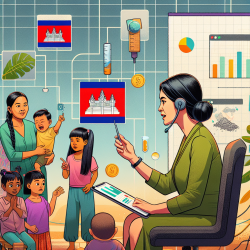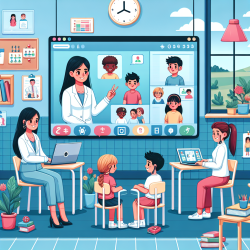Empowering Practitioners: Humanitarian Pediatrics for Better Child Outcomes
In the realm of pediatric healthcare, the challenges faced by children in humanitarian settings are profound and multifaceted. According to the research article "Humanitarian Pediatrics: A Statement of Purpose," the global community has yet to adequately address the needs of children affected by crises such as conflict, climate change, and pandemics. This blog aims to provide practitioners with insights into how they can enhance their skills to improve outcomes for children in these challenging environments.
The Case for Humanitarian Pediatrics
Children in humanitarian settings are disproportionately affected by the consequences of conflict and disaster. The research highlights that half of all deaths among children under five occur in such settings. Furthermore, the number of children living in conflict zones is staggering, with approximately 450 million children affected globally. Despite these alarming statistics, the current humanitarian system falls short in meeting their needs.
Humanitarian pediatrics emerges as a proposed field to bridge this gap. It aims to provide specialized care that addresses the unique health and developmental needs of children in crisis settings. This new field seeks to integrate best pediatric practices into humanitarian health responses, ensuring that children receive the care they need to thrive.
Improving Practitioner Skills
For practitioners working in humanitarian settings, there are several key areas where skill enhancement can lead to better outcomes for children:
- Understanding the Context: Practitioners must be aware of the political and security dimensions of conflict and how these factors impact child health. Training in these areas can enhance their ability to provide effective care.
- Specialized Clinical Skills: The burden of pediatric trauma and illness in humanitarian settings often differs from non-crisis environments. Practitioners need specialized skills to address both direct and indirect effects of conflict on children.
- Emotional and Psychological Support: Addressing the mental health needs of children and caregivers is crucial. Practitioners should be equipped with protocols and skills to provide emotional and psychological support to those experiencing trauma.
- Research and Training: Engaging in research specific to humanitarian pediatrics can help practitioners stay informed about the latest developments and best practices. Training programs should focus on equipping practitioners with the necessary skills to operate in crisis settings.
The Role of TinyEYE in Supporting Practitioners
At TinyEYE, we are committed to supporting practitioners in delivering high-quality care to children in need. Our online therapy services provide a platform for practitioners to enhance their skills and access resources tailored to humanitarian pediatrics. By leveraging technology, we aim to bridge the gap in pediatric care in crisis settings, ensuring that children receive the support they need to overcome the challenges they face.
Encouraging Further Research
The development of humanitarian pediatrics as a distinct field presents an opportunity for practitioners to engage in further research. By contributing to the body of knowledge in this area, practitioners can help shape the future of pediatric care in humanitarian settings. Collaboration with academic centers and major humanitarian bodies can drive innovation and improve outcomes for children globally.
To read the original research paper, please follow this link: Humanitarian pediatrics: A statement of purpose.










